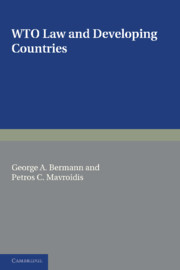Book contents
- Frontmatter
- Contents
- Contributors
- Developing Countries in the WTO System
- 1 The Legal Status of Special and Differential Treatment Provisions under the WTO Agreements
- 2 Trade Preferences to Small Developing Countries and the Welfare Costs of Lost Multilateral Liberalization
- 3 China in the WTO 2006: “Law and Its Limitations” in the Context of TRIPS
- 4 Developing Countries in the WTO Services Negotiations: Doing Enough?
- 5 Developing Countries and the Protection of Intellectual Property Rights: Current Issues in the WTO
- 6 Participation of Developing Countries in the WTO – New Evidence Based on the 2003 Official Records
- 7 Developing Countries and GATT/WTO Dispute Settlement
- 8 Representing Developing Countries in WTO Dispute Settlement Proceedings
- 9 Compensation and Retaliation: A Developing Country's Perspective
- 10 A Preference for Development: The Law and Economics of GSP
- 11 The GSP Fallacy: A Critique of the Appellate Body's Ruling in the GSP Case on Legal, Economic, and Political/Systemic Grounds
- 12 Is the WTO Doing Enough for Developing Countries?
- Index
5 - Developing Countries and the Protection of Intellectual Property Rights: Current Issues in the WTO
Published online by Cambridge University Press: 04 August 2010
- Frontmatter
- Contents
- Contributors
- Developing Countries in the WTO System
- 1 The Legal Status of Special and Differential Treatment Provisions under the WTO Agreements
- 2 Trade Preferences to Small Developing Countries and the Welfare Costs of Lost Multilateral Liberalization
- 3 China in the WTO 2006: “Law and Its Limitations” in the Context of TRIPS
- 4 Developing Countries in the WTO Services Negotiations: Doing Enough?
- 5 Developing Countries and the Protection of Intellectual Property Rights: Current Issues in the WTO
- 6 Participation of Developing Countries in the WTO – New Evidence Based on the 2003 Official Records
- 7 Developing Countries and GATT/WTO Dispute Settlement
- 8 Representing Developing Countries in WTO Dispute Settlement Proceedings
- 9 Compensation and Retaliation: A Developing Country's Perspective
- 10 A Preference for Development: The Law and Economics of GSP
- 11 The GSP Fallacy: A Critique of the Appellate Body's Ruling in the GSP Case on Legal, Economic, and Political/Systemic Grounds
- 12 Is the WTO Doing Enough for Developing Countries?
- Index
Summary
Introduction
The Agreement on Trade-Related Aspects of Intellectual Property Rights (TRIPS Agreement) provides minimum standards for the protection of intellectual property rights (IPRs) and does not envisage harmonization of these rights among all WTO Members. It makes it clear that Members are not obliged to implement more extensive protection, but does not prevent them from doing so. Although some important multilateral conventions pre-date the TRIPS Agreement, by the mid-1980s they no longer represented a functioning international consensus about the extent to which countries should protect the intellectual property of the nationals and companies of other countries, especially in the area of industrial property. The demandeurs for the inclusion of an intellectual property agreement in the Uruguay Round of negotiations were developed countries, notably the United States, EU, Japan, and Switzerland. Although one of the reasons for inclusion of this subject in trade negotiations may well have been the attractiveness of the trade enforcement mechanism, the trade forum was more importantly seen as one in which the chances of making progress from their perspective was higher because of the possibilities of making trade-offs with other areas.
Even if not all developing countries participated in these negotiations in equal measure, it would be fair to say that the developing countries' perspective was represented.
- Type
- Chapter
- Information
- WTO Law and Developing Countries , pp. 129 - 145Publisher: Cambridge University PressPrint publication year: 2007
- 1
- Cited by

